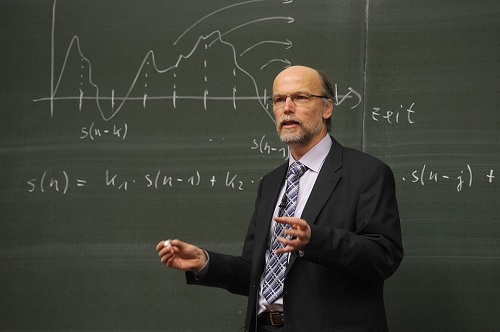Teachers and professors are respected people in the society who play significant roles, which propel the community to greater heights. A professor and a teacher are mostly found in the academic fields where they polish their skills while at the same period engaging in making the world a better place for other people.
-
Who is a Teacher?
A teacher is a person who has expertise in delivering skills to young people, especially in school where an organized teaching platform is arranged. Teachers are skillful and patient by ensuring that they pass the right skills and knowledge to young people who are yet to master the skill of understanding or conceptualization.
-
Who is a Professor?
A professor is a skillful person who has acquired significant knowledge and skills related to a specific area through lengthy periods of study and research. It is important to highlight that a professor offers teaching activities at college and university levels.
Differences Between a Teacher and Professor
-
Level of Education for Teacher and Professor
One of the main difference between a teacher and a professor is the level of education. A professor is required to have a higher level of education as compared to a teacher who has a medium level of education. Specifically, for one to be a professor, he or she must have attained bachelors degree, master degree, and doctorate while at the same time convincing a jury of academician that he or she ought to be recognized as a professor concerning their contributions in a certain field. Besides, professors are required to have high levels of education because they teach university students who can conceptualize and interrogate different scenarios. On the other hand, a teacher is just required to have a first degree.
-
Place of Work for Teacher and Professor
The other difference between a teacher and a professor is that they both work in different levels of institutions. Teachers work in primary schools and at the high school. Teachers in fundamental level are tasked with ensuring that they pass fundamental knowledge to the young pupils while at the same time ensuring that they explain to them why it is important to learn. Teachers at high school level pass advanced knowledge to students who understand the importance of learning and who can at least develop a conceptual analysis of a certain phenomenon. On the other hand, professors pass skills and knowledge to students at colleges and universities. They are required to pass advanced but specialized knowledge to students who can conceptualize and interrogate a specific phenomenon.
-
Interaction with Students
Teachers at primary level have a high level of interaction with their young pupil on a daily basis. Teachers are required to interact with the young children who experience high levels of loneliness and homesick after being separated with their parents. The interaction is also geared towards ensuring that teachers explain to the young people the importance of learning. The level of interaction reduces at high school level where there is a moderate level of instructions. On the other hand, there is less or no interaction between students and professors at the university or college level. Professors are just required to give instructions after which the students are required to comply.
-
Research Activities of Teacher and Professor
The level of research conducted by both a professor and a teacher is another point of expressing the difference between the two professions. Professors are required to conduct a specific number of both primary and secondary research. It is important to highlight that one must provide significant research knowledge in his or her field of knowledge before being recognized as a professor. One must contribute to knowledge and a scholarly expert before being named a professor. Also, professors are required to guide their students as well as supervise them when they conduct both primary and secondary research. On the other hand, teachers are not required to conduct primary or secondary research because research activities are not offered at primary and secondary levels.
-
Financing
Another difference between a teacher and a professor is the financing required before one becomes a teacher or a professor. For one to become a professor, he or she must undergo all the basic levels of learning which include primary, high school, university for both undergraduate and postgraduate degrees, and doctorate levels. Besides, a professor must satisfy his level of knowledge through research. On the other hand, a teacher just requires sufficient resources which will take him or her up to a graduate level.
-
Salary and Compensation of Teacher and Professor
Lastly, there is a meaningful difference between a teacher and a professor regarding salaries and compensation they receive. Concerning the amount of work and expectations bestowed in either teachers or professors, they both receive different wages and benefits. Teachers receive moderate to average wages in various parts of the world concerning the agreement with the employer. On the other hand, professors receive high wages coupled with a certain number of benefits because they are the highest-ranking employees in the university and colleges.
Table Showing Differences Between Teachers and Professors
| Teachers | Professors | |
| Level of Education | Bachelors Degree | Doctorate |
| Work Station | Primary and Secondary | University and College |
| Research | No Research Required | Research is Required |
| Salary and Compensation | Moderate to Medium | High Salaries and Benefits |
| Financing | Less amount required to be a teacher | Significant amount necessary to be a teacher |
Summary of Teacher and Professor
- Both teachers and professors play a significant role in the learning institutions because they provide skills and knowledge to all the young children and mature students who are looking forward to advancing their knowledge.
- However, it is important to highlight that both teachers and professors have a significant number of differences, which ranges from the level of education, salaries, working stations, and research activities among others.
- Difference Between Gross NPA and Net NPA - April 20, 2018
- Difference Between Job Description and Job Specification - April 13, 2018
- Difference Between Yoga and Power Yoga - April 10, 2018



